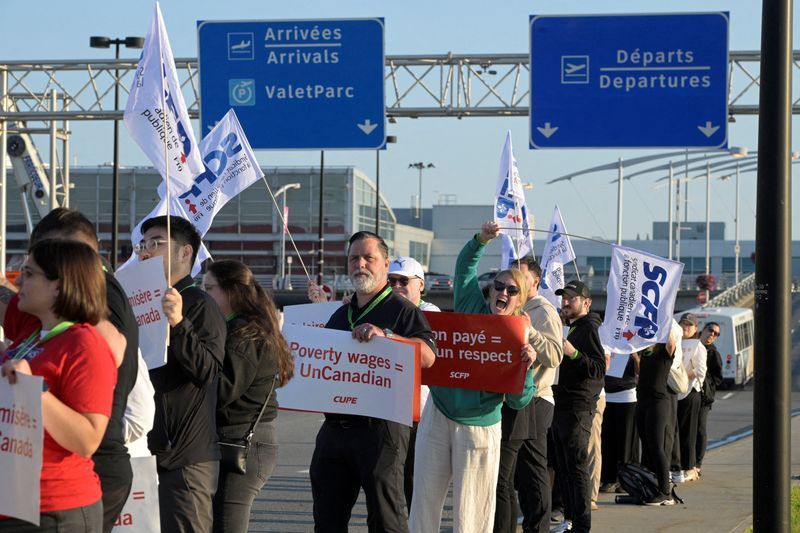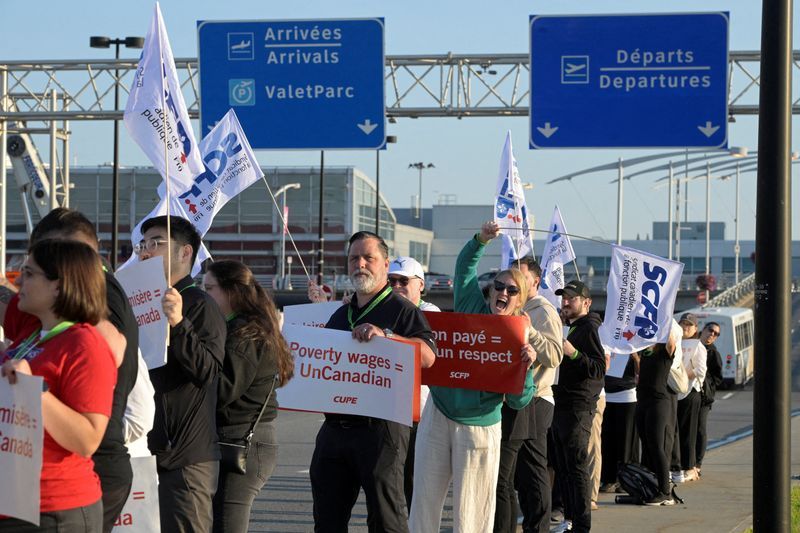
TORONTO/OTTAWA (Reuters) -Hundreds of Air Canada employees formed picket lines outside major Canadian airports on Saturday, hours after unionized flight attendants walked off the job in a contract dispute that has disrupted travel for tens of thousands of passengers.
The strike, which started just before 1 a.m. EDT (0500 GMT), had forced Canada’s largest airline to suspend the majority of its 700 daily flights, affecting more than 100,000 travelers who were forced to find alternative flights or stay put.
As of Saturday morning, there were no bargaining sessions scheduled between the two sides, which have held on-and-off negotiations for months.
The Canadian Union of Public Employees, representing more than 10,000 Air Canada flight attendants, confirmed the stoppage in a social media post. It is the first strike by Air Canada flight attendants since 1985.
Outside Toronto Pearson International Airport – the country’s busiest – hundreds of cabin crew waved flags, banners and picket signs. Union officials called on members to assemble outside all of the country’s major airports, including in Toronto, Montreal, Calgary and Vancouver.
Montreal-based Air Canada said the suspended flights included those operated by its budget arm, Air Canada Rouge. The stoppage would affect about 130,000 customers a day, the carrier said in a statement. Flights by Air Canada’s regional affiliates – Air Canada Jazz and PAL Airlines – will operate as usual.
“Air Canada is strongly advising affected customers not to go to the airport unless they have a confirmed ticket on an airline other than Air Canada or Air Canada Rouge,” the airline said.
WAGE DISPUTE
The dispute between the union and the airline centers on wages. Attendants are currently paid only when their plane is moving. The union is seeking compensation for time spent on theground between flights and when helping passengers board.
The union has said Air Canada offered to compensate flight attendants for some work that is now unpaid but only at 50% of their hourly rate.
The carrier had offered a 38% increase in total compensation for flight attendants over four years, with a 25% raise in the first year, which the union said was insufficient.
The impact of a strike will ripple far beyond Canada. Air Canada is the busiest foreign carrier servicing the U.S. by number of scheduled flights.
While passengers have generally voiced support for the flight attendants on social media, Canadian businesses – already reeling from a trade dispute with the U.S. – have urged the federal government to impose binding arbitration on both sides, ending the strike.
The Canada Labour Code gives Jobs Minister Patty Hajdu the right to ask the country’s Industrial Relations Board to impose binding arbitration in the interests of protecting the economy.
Air Canada has asked Prime Minister Mark Carney’s minority Liberal government to act, but the union says it wants a negotiated solution, as binding arbitration would take pressure off the airline.
Hajdu has repeatedly urged the two sides to return to the bargaining table.
In a note to clients, analysts at financial services firm TD Cowen urged the carrier to “extend an olive branch to end the impasse,” adding that investors are worried that any cost savings on labor would be outweighed by lost earnings in the airline’s most important quarter.
“We think it would be best for AC to achieve labor peace,” the note said. “Not budging on negotiations risks being a Pyrrhic victory.”
(Reporting by Allison Lampert in Montreal, and Utkarsh Shetti in Bengaluru. Additional reporting by Kyaw Soe Oo in Toronto and Disha Mishra in Bengaluru; Editing by Frank McGurty and Paul Simao)






